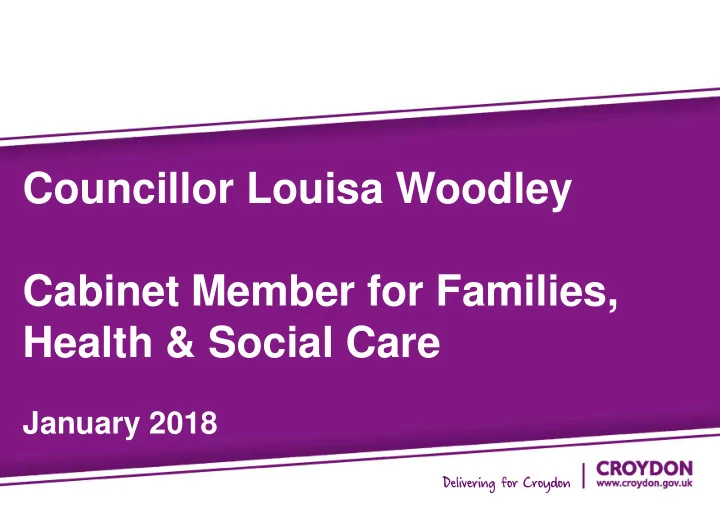

Councillor Louisa Woodley Presentation Title Presented by John Smith Cabinet Member for Families, Health & Social Care September 2013 January 2018
Overview • Transforming adult social care (TRASC) • All age disability and adults programme of transformation (Adapt) • Mental health • One Croydon Alliance • Budget challenges • Integration of health and social care and HWBB 2
Transforming adult social care 2016/17 focussed on managing demand and getting the basics in place relating to workforce, practice, process and people. Alignment of some business processes and wider projects are on-going, they will be rolled into the phase two programme: • Resource Allocation System (RAS) • Self-assessment on-line • Reablement • Communication and engagement 3
Adapt - principles of creating a sustainable future A life, not a care plan • Prevent Reduce Delay • Embrace personalisation • Focus on individual outcomes and people living as independently • Partnership working is crucial • Strong capable commissioning • Well led, professional and strong operational function • Finance business partners who challenge and advise the DASS • Deliverable savings and good implementation arrangements 4
Adapt - key areas of focus for 2018/19 & 19/20 Transformational areas • 25-65 disabilities operational transformation • A new offer on how people spend their time – active lives • One Croydon Alliance and outcomes based commissioning Efficiency • Workforce reform and transformation – reducing silos and management • Mental health • Accommodation, commissioning and contracting 5
Mental health challenges • CQC requires improvement rating for SLAM • S117 joint funding • CCG disinvestment in employment and rights services • Accommodation 6
Woodley Review - themes • Governance • Shift to prevention • Commissioning • Service user engagement • Need to deliver meaningful change for BME service users • Communication 7
Woodley Review – recommendations • Review membership and governance of the Mental Health Strategy group and Partnership Board • Review the mental health budget • Embed the Mind the Gap report / Woodley review recommendations into the Mental Health Strategy Action plan • To work with service users, through existing service user forums i.e. Hear Us, the BME Forum, and Healthwatch 8
One Croydon Alliance Alliance agreement (phase one) signed in Apr 17 business case of the transformation signed off Jun 17; i.e. Out of Hospital (OOH) transformation Implementation of the Living Independently for Everyone (LIFE); and Integrated Community Networks (ICN) schemes System is realising tangible benefits of this transformation, providing an incentive for the Alliance to continue working together. Dec 17, phase two signed off, a further nine year period from Apr 18 Phase three, opportunities such as whole population transformation, being analysed 9
Out of hospital performance ICN (Integrated Community Networks) 22 out of 54 Huddles implemented at the end of November (additional 17 scheduled for implementation). LIFE (Living Independently For Everyone) Discharge to Assess (Reablement, Rehabilitation, Recovery) at Home phased roll out completed in CUH. 10
One Croydon Alliance Discharge to assess / LIFE – feedback User feedback ‘Many many thanks to you and the whole team for looking so very well after my Mum. She had done immensely well over the 6 weeks. Your team has been patient and encouraging. Also thanks to your assistance; Mum has just received her Dial A Ride card. She will start using it this week. She will be very happy to be able to get out with her friends’ Staff feedback ‘From a primary care perspective, we’ve seen better outcomes for those patients, our high intensity users. We’ve observed reductions in telephone appointments, we’ve seen a reduction in actual GP appointments and the need for home visits as a result of Age UK Croydon. I think a lot of of that is down to the fact that they’ve got that PIC that they can contact’ ‘The introduction of the D2A process has been so positive for patients, their families and carers. For me the process encourages joint working between health and social care within the hospital and this joint working continues once the patient has been discharged home. At all stages the patient is central to all decision making. D2A ensures that the patient spends less time in their own homes with bespoke packages of care. The service is committed to enabling patients to recover, re-able and rehabilitate at home and as a result we have seen really positive outcomes for patients that have been referred’ 11
Financial challenges 17/18 pressures • Increases in demographics, complexity of need and number of care packages. • Placing people in nursing / domiciliary care. • Ordinary residence / sleeping nights 18/20 budget, growth and savings • Agreement in principle awaiting February 2018 Cabinet approval. General Fund 13/14 14/15 15/16 16/17 17/18 Budget £112.909 £104.875 £102.420 £103.266 £99.900 Outturn £117.003 £109.379 £105.751 £106.478 £101.823 £4.094 £4.504 £3.331 £3.208 1.923* Overspend Q2 forecast * Without drawing down IBCF tranche 2. People aged 65 and over predicted to have dementia 2015 2020 2025 2030 3,463 3,914 4,536 5,417 Population 2016 2030 Growth Key demand indicators for the service, December 2017 change Six month percentage change shown in brackets Care packages – planned hours, OP,PD, LD, MH 86,945 8% 0-24 122,698 133,992 9.20% Placements – residential & nursing, OP,PD, LD, MH 909 -3.2% 25-64 210,930 223,134 5.79% No. of contacts / referrals 3008 -1% 65+ 49,780 71,488 43.61% No. of new social care assessments 1879 6% 12
Integration of health and social care and HWBB Very informative visit to Manchester • Discussions as regards where they are re integration • Importance of governance & accountability • Lessons learnt. 13
Recommend
More recommend